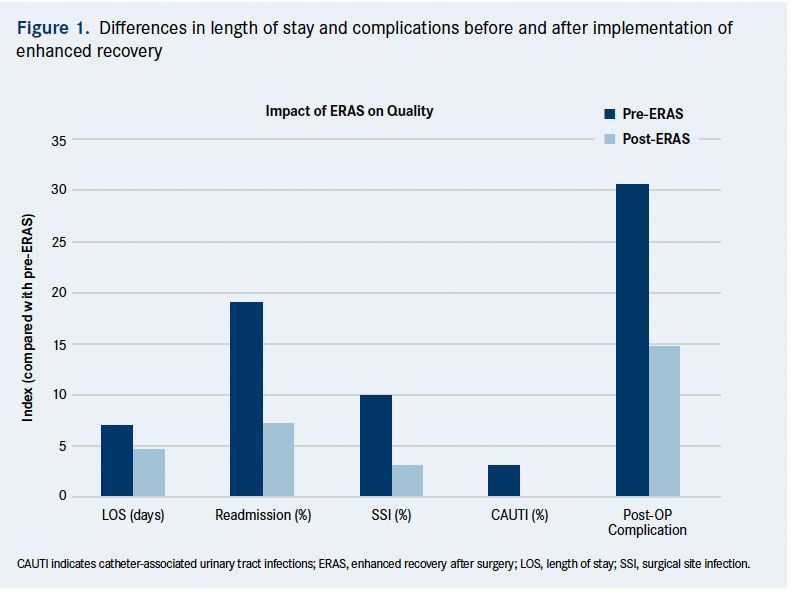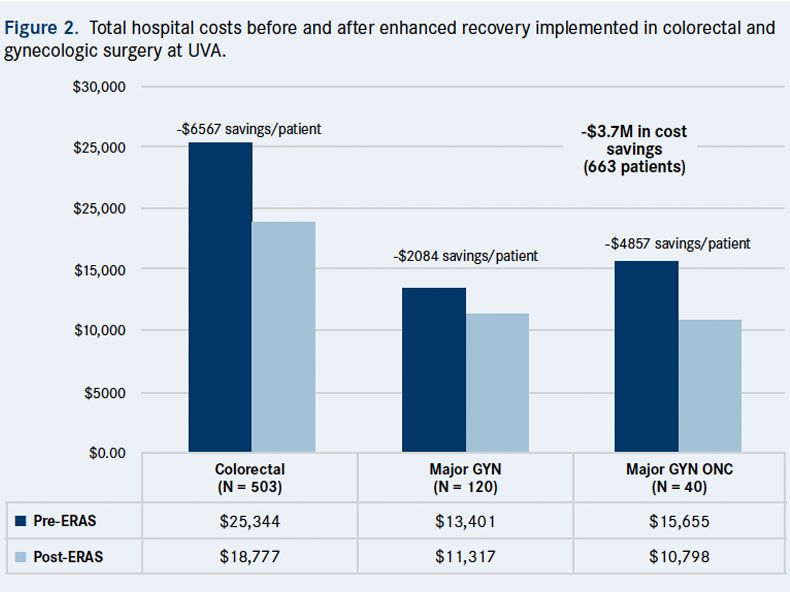A Better Way to Prepare Patients for CRC Surgery and Shorten Recovery Time
At the University of Virginia (UVA) Health System, the enhanced recovery after surgery (ERAS) program in colorectal cancer has improved outcomes of patients after procedures and reduced hospital costs.
Traci L. Hedrick, MD, MS
Assistant Professor, Surgery
Co-Director, Enhanced Recovery Program
The adoption of enhanced recovery after surgery (ERAS) protocols can improve not only the outcomes of patients after a procedure but can also reduce hospital costs, as has been seen in an ERAS program in colorectal cancer at the University of Virginia (UVA) Health System.
Surgical resection offers a cure for thousands of patients with colorectal cancer each year. Yet for many, this experience can be accompanied by surgical complications and prolonged recovery times. Colorectal surgery has traditionally been associated with higher morbidity rates than many other types of surgery for a multitude of reasons. The surgeries are often complex, involving multiple quadrants, and are further complicated by the anatomical constraints of the pelvis. Even with the advent of minimally invasive surgery, it was not uncommon for patients to be incapacitated for several weeks.
The ERAS movement, first proposed by Danish surgeon Henrik Kehlet, is based on many common-sense principles that had been overlooked with the advent of modern medicine.1 The basic premise of enhanced recovery is to keep the patient in a normal physiologic state during the perioperative period. This is accomplished through the avoidance of many well-meaning, yet misguided, traditional surgical practices, including preoperative fasting, liberal intravenous administration of high-salt fluids, and opioid-centric pain management strategies.
To date, more than 10 case-control studies including over 3000 participants have demonstrated shortened recovery time and decreased complications in ERAS patients within a variety of surgical patient populations.2-14
Instead of starving patients prior to surgery, patients are encouraged to consume clear liquids with carbohydrate loading up to 2 hours prior to surgery. This avoids the deleterious catabolic state at the onset of surgery, which has been shown to mediate insulin resistance, leading to loss of lean muscle.15
Given that patients are not dehydrated prior to surgery, they do not require resuscitation with salt-laden intravenous fluids that flow into the extracellular space. This helps to prevent peripheral edema, which can restrict movement postoperatively, and edema in the bowel wall, which contributes to ileus. To further reduce the reliance on intravenous fluids, patients are allowed oral intake immediately after surgery. Additionally, patients are mobilized early and frequently following surgery to further prevent muscle loss in the postoperative period.
Another one of the main tenets of ERAS protocols is the avoidance of opioids for pain control. For decades, opioid analgesia has provided the primary means of controlling pain in patients undergoing major surgery in the United States. However, opioid analgesia has deleterious effects on surgical recovery including respiratory depression, gut dysmotility, and delirium, in addition to the potential for abuse.
Prescription opioids are now among the leading causes of overdose deaths in the United States, and surgeons are one of the leading providers of opioid prescriptions nationwide.16,17 ERAS aims to reduce opioid intake through the use of multimodal analgesia, such as anti-inflammatory agents, local anesthetics, and other nonopioid pain management strategies.
Impact of Enhanced Recovery at the University of Virginia
We implemented a multidisciplinary ERAS protocol in patients undergoing major colorectal surgery in 2013 at the UVA Health Center.18 We observed dramatic improvements in colorectal surgery quality outcomes including a 2-day reduction in length of stay, an 80% reduction in opioids, and a 50% reduction in overall complications (Figure 1). There was a $6567 per patient reduction in total hospital costs and significant improvements in patient satisfaction.
Figure 1

These quality improvements have been sustained for 3 years, as reflected in drastic improvements in UVA standings within the National Surgical Quality Improvement Program (NSQIP) as compared with our peer institutions. Our experience with enhanced recovery was subsequently featured in the US News & World Report as well as in the Wall Street Journal.19,20
Based on our experience with colorectal surgery, we developed an institutional enhanced recovery program and hired a full-time dedicated nurse coordinator with a goal to implement enhanced recovery throughout UVA Health System. We implemented ERAS in obstetrics, thoracic surgery, and gynecology, which resulted in significant improvements similar to our experience with colorectal surgery,21 and have plans to implement in orthopedics, hepatobiliary, and spine surgery.
To date, ERAS has accounted for $3.7 million in cost savings and more than 1100 bed-days saved at UVA. This has opened capacity for 204 new admissions over a 2-year period, which is critical given that our hospital runs chronically at near-full capacity (Figure 2).
Another key aspect of our success with the ERAS protocol has been patient engagement. We developed printed patient education materials, an educational video and website, and developed an app (UVA ERAS) to educate patients prior to colorectal surgery. This app was developed with stakeholder input from colorectal surgery patients and healthcare providers.
Figure 2

Each of these educational materials outlines exactly what is going to happen to the patient every step of the way and actively involves them as part of the treatment team. We have found that patients and their families take pride in managing their surgical care and derive great satisfaction from direct involvement.
Enhanced recovery is based on standardization of care and direct engagement of the patients and healthcare providers. Its impact reaches far beyond that of the perioperative period. Surgical complications are known to delay or prevent adjuvant chemotherapy in patients with colorectal cancer and are associated with an increased risk of recurrence. Through a reduction in surgical complications, it is our hope that oncologic outcomes will also improve as a direct result of the enhanced recovery protocol
References
- Kehlet H. Multimodal approach to control postoperative pathophysiology and rehabilitation. Br J Anaesth. 1997;78(5):606-617.
- Vanounou T, Pratt W, Fischer JE, Vollmer CM, Jr, Callery MP. Deviation-based cost modeling: a novel model to evaluate the clinical and economic impact of clinical pathways. J Am Coll Surg. 2007;204(4):570-579. doi:10.1016/j.jamcollsurg.2007.01.025.
- Tang J, Humes DJ, Gemmil E, Welch NT, Parsons SL, Catton JA. Reduction in length of stay for patients undergoing oesophageal and gastric resections with implementation of enhanced recovery packages. Ann R Coll Surg Engl. 2013;95(5):323-328. doi:10.1308/0 03588413X13629960046039.
- Reismann M, Dingemann J, Wolters M, Laupichler B, Suempelmann R, Ure BM. Fast-track concepts in routine pediatric surgery: a prospective study in 436 infants and children. Langenbecks Arch Surg. 2009;394(3):529-533. doi:10. 1007/s00423-008-0440-1.
- Porter GA, Pisters PW, Mansyur C, et al. Cost and utilization impact of a clinical pathway for patients undergoing pancreaticoduodenectomy. Ann Surg Oncol. 2000;7(7):484-489.
- Khreiss W, Huebner M, Cima RR, et al. Improving conventional recovery with enhanced recovery in minimally invasive surgery for rectal cancer. Dis Colon Rectum. 2014;57(5):557-563. doi:10.1097/ DCR.0000000000000101.
- Kennedy EP, Rosato EL, Sauter PK, et al. Initiation of a critical pathway for pancreaticoduodenectomy at an academic institution— the first step in multidisciplinary team building. J Am Coll Surg. 2007;204(5):917-923; discussion 923-924. doi:10.1016/j. jamcollsurg.2007.01.057.
- Kennedy EP, Grenda TR, Sauter PK, et al. Implementation of a critical pathway for distal pancreatectomy at an academic institution. J Gastrointest Surg. 2009;13(5):938-944. doi:10.1007/s11605-009- 0803-0.
- Kalogera E, Bakkum-Gamez JN, Jankowski CJ, et al. Enhanced recovery in gynecologic surgery. Obstet Gynecol. 2013;122(2 Pt 1):319-328. doi: 10.1097/AOG.0b013e31829aa780.
- di Sebastiano P, Festa L, De Bonis A, et al. A modified fast-track program for pancreatic surgery: a prospective single-center experience. Langenbecks Arch Surg. 2011;396(3):345-351. doi: 10.1007/ s00423-010-0707-1.
- Daneshmand S, Ahmadi H, Schuckman AK, et al. Enhanced Recovery Protocol after Radical Cystectomy for Bladder Cancer. J Urol. 2014;192(1):50-55. doi: 10.1016/j.juro.2014.01.097.
- Connor S, Cross A, Sakowska M, Linscott D, Woods J. Effects of introducing an enhanced recovery after surgery programme for patients undergoing open hepatic resection. HPB (Oxford). 2013;15(4):294-301. doi:10.1111/j.1477-2574.2012.00578.x.
- Blom RL, van Heijl M, Bemelman WA, et al. Initial experiences of an enhanced recovery protocol in esophageal surgery. World J Surg. 2013;37(10):2372-2378. doi: 10.1007/s00268-013-2135-1.
- Balzano G, Zerbi A, Braga M, Rocchetti S, Beneduce AA, Di Carlo V. Fast-track recovery programme after pancreatico-duodenectomy reduces delayed gastric emptying. Br J Surg. 2008;95(11):1387-1393. doi:10.1002/bjs.6324.
- Carli F. Physiologic considerations of Enhanced Recovery after Surgery (ERAS) Programs: implications of the stress response. Can J Anaesth. 2015;62(2):110-119. doi:10.1007/s12630-014-0264-0.
- Injury Prevention & Control: Opioid Overdose. Centers for Disease Control and Prevention. http://www.cdc.gov/drugoverdose/. Accessed December 28, 2016.
- Forensic Epidemiology. Virginia Department of Health. http:// www.vdh.virginia.gov/medical-examiner/forensic-epidemiology/. Accessed December 28, 2016.
- Thiele RH, Rea KM, Turrentine FE, et al. Standardization of care: impact of an enhanced recovery protocol on length of stay, complications, and direct costs after colorectal surgery. J Am Coll Surg. 2015;220(4):430-443. doi:10.1016/j.jamcollsurg.2014.12.042.
- Landro L. Patients bounce back faster from surgery with hospitals’ new protocol. Wall Street Journal. March 31, 2015. http://www.wsj. com/articles/patients-bounce-back-faster-from-surgery-with-hospitals- new-protocol-1427739292. Accessed December 28, 2016.
- Crane K. Enhanced recovery: improving patients’ surgical experience. US News & World Report. February 4, 2015. http://health. usnews.com/health-news/patient-advice/articles/2015/02/04/ enhanced-recovery-improving-patients-surgical-experience. Accessed December 28, 2016.
- Modesitt SC, Sarosiek BM, Trowbridge ER, et al. Enhanced Recovery Implementation in Major Gynecologic Surgeries: Effect of Care Standardization. Obstet Gynecol. 2016;128(3):457-466. doi:10.1097/AOG.0000000000001555.



